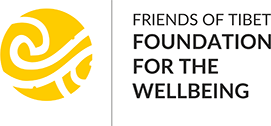The Wellbeing Programme is a philanthropic initiative by Friends of Tibet to support the cause of Tibet and to create awareness about the issue of Tibet amongst people all over the world. This initiative researched, designed and implemented by Friends of Tibet aims at the restoration, propagation and promotion of the endangered traditions and practices of Tibet.
Wellness and Wellbeing — the Tibetan Approach
(Left) Prof GV Sreekumar, Head of IDC School of Design welcomes the gathering during the inaugural ceremony of 2nd Wellbeing Tibetan Medical Camp organised jointly by Friends of Tibet Foundation for the Wellbeing at IIT Bombay from May 13-14, 2017. (Right) Disha Shetty, Friends of Tibet Campaigner welcomes Dr Dorjee Rapten Neshar for his lecture on "Mind & Body Health in Tibetan Medicine". (Photos: Mohith Mohan & Sam Santhosh)
Day 1: "Help your body heal itself," "Live in balance with the elements of Nature," "Numbers by themselves do not mean much," were some of the key messages Dr Dorjee Rapten Neshar had for his audience at IIT Bombay. The 2nd Wellbeing Tibetan Medical Camp organised by Friends of Tibet Foundation for the Wellbeing from May 13-14, 2017 at IIT Bombay met with keen interest in the Tibetan way to good health.
The health camp was presented by Prof GV Sreekumar (Head, IDC-IIT) and the screening of a documentary on Tibetan Medicines by Disha Shetty (Campaigner, Friends of Tibet). The well-researched documentary brings out experiences of patients of Tibetan medicine from various Indian towns and cities. “We are seeing greater awareness about Tibetan healing methods globally," he shared from his vast learning and experience with patients and mind-sets. In his talk at IIT Bombay, he highlighted the changing mind-sets of people towards health. He pointed out how health milestones have been reduced to numbers — based upon generic parameters for measuring Blood Pressure, Sugar, Cholesterol etc.
Compared with the scenario about 50 to 60 years ago when people were much more conscious and aware of their health and body disposition, one sees reduced clarity and even a sense of connectivity with one's body today. In those days, various forms of medicine — Ayurveda, Unani, Siddha, traditional Chinese and Tibetan medicine prevailed and health was understood in a more holistic way than it is now. Human beings had their values and respected their surroundings, the environment — everything with a sense of totality that seems to be missing today.
Calling the present era a 'degenerative era or Kaliyuga' he spoke about the responsibility of everybody towards the health of the individual and also the health of the community, society, nation. To quote, "This era, we seem to have lost the concept of health... I deal with patients... even a hardened person like me is totally taken aback by the total ignorance of the people... people have lost touch with their own health... mechanistic about their body... believe only numbers — BP: 120/180, 130/180; diabetes: number goes up, they start feeling a problem... even if they are healthy."
"Having said that, numbers are important and relevant, esp in Cancer cases where the doctors get insights about the progression of the disease. But, it is necessary to look within ourselves and continue to listen to our inner voice. Otherwise, we would become 'like guinea pigs.' We also lose all touch with our body's own inner defence mechanisms... inner healing system."
One key insight is about the indiscriminate use of drugs. Dr Dorjee cautioned the audiences against this and made an impassioned plea to use lifesaving drugs like insulin, or pain killers judiciously. According to statistics, more than 70% of diseases are caused by drugs taken over a period of time continuously, without any check on the impact on the internal systems.
Dr Dorjee Rapten Neshar, Chief Medical Officer of Men-Tsee-Khang Bangalore branch delivers his lecture on "Mind & Body Health in Tibetan Medicine" at IDC School of Design, IIT Bombay.
Tibetan medicines, Ayurvedic systems are systems of knowledge built upon a holistic understanding. Tibetan medicine is believed to be based upon Buddha's teachings — four fold suffering that we as humans cannot escape — no matter how much healthily happily we try to live... because we cannot get separated from our fundamental mental poison — ignorance. Now ignorance is a Buddhist concept — literally means that you don't understand the known existence of the self. The self doesn't really exist. Therefore all sorts of negative emotions, afflictions — hatred, anger, avarice, aversion, lust, attachment, and delusions, affect us. Today, the world seems to be moving towards this egotistic attitude where 'I' is the most important person. If you look closely at the nature of the problem you are suffering from, you will try to relate your problem with your ailment. Many kind of diseases — thyroid, hypothyroid conditions rheumatoid arthritis, various forms of cancer... message these diseases give you can relate them to some part of your emotion. The organs of the body are interconnected and associated with our emotions — each of these organs has a separate season to show aggravation. Certain seasons see a flare up of the diseases, in spite of taking medicines while in other seasons there is a feeling of wellness.
That's how the perception of the whole disease — cosmology where you are the centre of your own universe. You have like the universe, sustained by the dual energy of solar and lunar energy. Similarly our human body right from conception... far more primordial than that... time immemorial — right from the beginning, sustained by these two dual energies. Chinese call it Yin and Yan. In Tibetan we call it 'Dak' — Solar Energy and 'Sip' — Lunar Energy.
Your body system is governed by either a solar or lunar disposition. Our body's energetically disposition is either solar energy or lunar energy. What is the significance of this? Nature of solar energy — heat. You become kind of vulnerable to diseases which cannot withstand heat. There's an inner heat... itching, headaches, etc. Your disease have a tendency to flare up in heat conditions. Any food that produces heat in your body can create such issues.
'Health is actually a balance of the solar energy and the lunar energy — balance of the vital force energy.' To balance it you would take food which is more cooling to the system. Avoid heat creating items to balance your body energy. He explained at length the correlation between the balance of the 5 elements, 6 tastes, 8 potencies, body systems, human emotions, food we eat and lifestyles.
The talk was followed by questions where two questions were related to identification and characterisation of new diseases and the presence of metal (Lead) in Tibetan medicine.
In reply, he pointed out that all diseases would come under the purview of the 'Tridoshas' or 'Dak and Sip.' The detailed explanation was logical, scientific and convincing. As for the presence of metals, he replied that it was not only lead but also mercury that was used. These metals are used in the 'Precious Pill' that is taken by Yogis and saints who go into the Himalayas for meditation. These metals are poisonous if used in a particular way but in Tibetan medicine there was a 6-month elaborate process of purification which included spiritual prayers and vibrations that brought out the healing powers of these metals.
The talk was followed by the documentary on Tibetan Medicines that brings out researched findings on Tibetan healing, wellness and spirituality.
Dr Dorjee Rapten Neshar, Chief Medical Officer of Men-Tsee-Khang Bangalore branch conducts the 2nd Wellbeing Tibetan Medical camp at IIT Bombay organised by Friends of Tibet Foundation for the Wellbeing in association with IDC School of Design, IIT Bombay.
Day 2: Several participants in a couple of hours — some in faith, some to try, some to test Dr Dorjee Rapten's statements about health and Wellbeing. Through Pulse Diagnosis, Dr Dorjee was able to help people understand how they could improve their food habits, lifestyle and health. People came away realising the need for listening to your own body, eating healthy and maintaining balanced lifestyles. The seeds of awareness are sown! May health and wellness grow!
* Dr Nanduri Aparna Rao is a Senior Project Manager at the Centre for Entrepreneurship IIT Bombay. She comes with over two decades of teaching and industry experience and is responsible for curriculum development, student affairs and mentoring students in their start-ups.
Friends of Tibet Foundation for the Wellbeing, PO Box 16674, Mumbai 400050, India.
(Dr Nanduri Aparna Rao*, IIT Bombay, May 13-14, 2017)
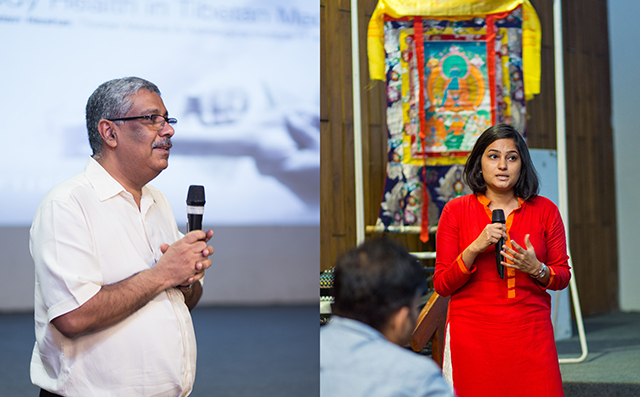
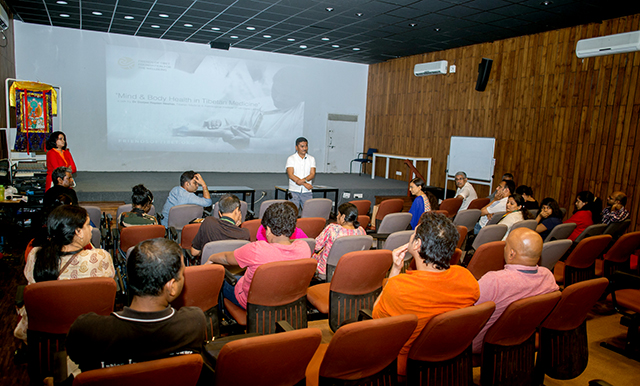
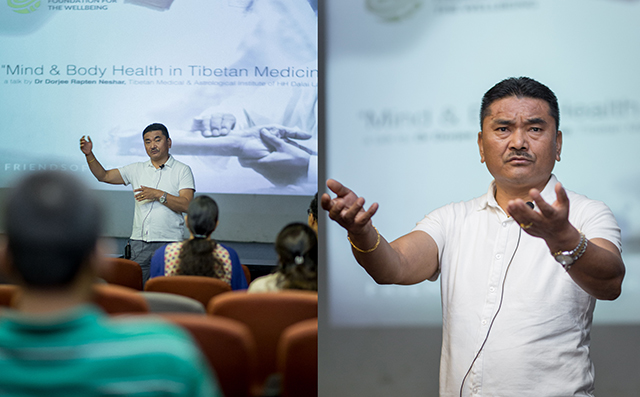
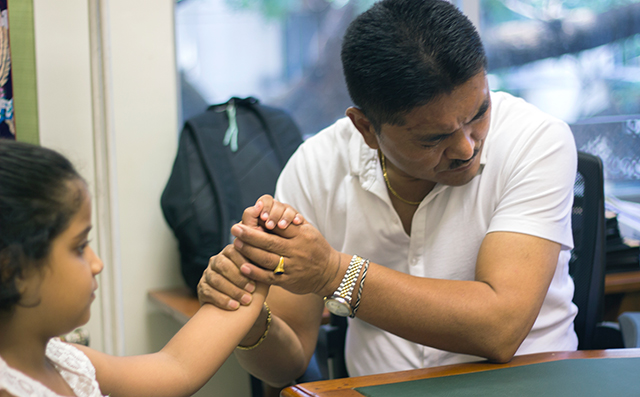
⋯
About Dr Dorjee Rapten Neshar: Born in Kyidong, Tibet, Dr Dorjee Rapten Neshar escaped to India with his family in 1969 following the Chinese occupation of Tibet. Dr Dorjee received his medical training at the Tibetan Medical College in Dharamshala where he completed intensive study in the Tibetan Medical System. He acquired most of his practical experience into the more profound level of health & healing through late Dr Tenzin Cheodrak, the former Chief Physician to His Holiness the XIV Dalai Lama. Over two decades of dedicated service in the practice of Tibetan Medicine, he has attended many national and international conferences; presented papers on Tibetan Medicine and has published articles. As the Chief Medical Officer of Men-Tsee-Khang Bangalore Branch, Dr Dorjee Rapten Neshar and his medical team covers the Tibetan Medicine health services in south Indian cities and towns regularly. He is also the former chairman of the Central Council of Tibetan Medicine. An alumnus of the Tibetan Medical College in Dharamshala, he is trained in medico-spiritual initiations for the more esoteric prac1ce of Tibetan medicine as well. In recognition of his outstanding contribution in the held of Alternative Medicine, Dr Dorjee Rapten was awarded the Gold Medal & Gem of Alternative Medicine in 1995 & 1996 from the Indian Board of Alternative Medicine, Calcutta. He also received the International Award of Excellence, from the American Organisation of Intellectuals Inc., New York, USA.
Email: wellbeing@friendsoftibet.org Web: www.friendsoftibet.org/wellbeing/

